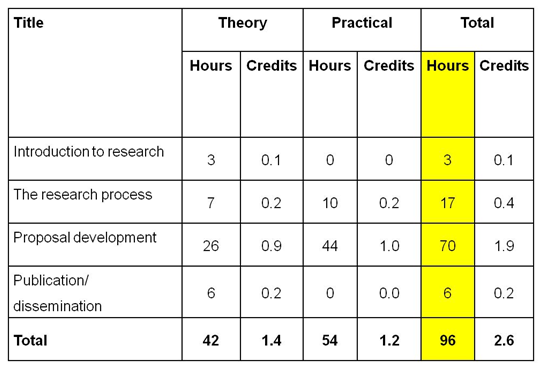Dear Student,
This module intends to equip you with knowledge and skills to
conduct health related research. You will be exposed to different aspects of
research methods that will include developing a research proposal, which can be
implemented as a project leading to a dissertation. The School of Public Health
and Social Sciences (SPHSS) will rely on the Research Methods module as the
engine for a tangible product (a research proposal).
1.2 Module Objectives
|

|
At the end of this module you should be able to:
i.Define certain concepts in
research proposal development
ii.Identify and conceptualize
a research problem
iii.Define certain concepts in research
proposal development
iv.Describe the steps on how to write a research
proposal
v.Develop
a research proposal for your dissertation
vi.Develop
and use a data collection instrument for a mini-study
vii.Sample
a study population and collect relevant data
viii.Analyse
and present data (both qualitative and quantitative)
ix.Search literature and use
reference managers to organize references
x.Appraise the literature of
a research topic of interest
xi.Present and defend a
research proposal.
xii.Demonstrate the ability to
use research methods in collecting, analyzing and presenting data and
disseminating information to stake holders and wider audience.
xiii.Design a mini-study for the
Research Method Module.
|
1.3 Module
Components and content
The
aim of the Module is to enable you to plan, develop
and conduct research that aims at addressing health problems of public health
importance in any given country. This skill will also enable you to analyze and
interpret data, draw conclusions on the findings, write a concise research
report and summary of research findings and disseminate them to different
audiences including publications. The basic requirement for this module is to
have a clear definition of what research is and its contribution to new
knowledge (to solving public health problems). The module will be covered in 96
hours and is worth 2.6 credits as shown in the table below.

1.4 Module content
The Research Methods Module will consist of 17 topics with varying
numbers of sessions. This session will introduce you to the module itself
followed by introduction to research including meaning and significance of
research. The module will cover topics related to research proposal
development, research process including methods of implementation, data
analysis and interpretation as well as publication and dissemination of
research findings.
This Module will have the following Topics:
|
Topics
|
Topic
description
|
Page
number
|
|
Topic 1
|
Introduction
to the Research Methods Module
|
Page number
|
|
Topic 2
|
Identifying/defining
a research problem and making a problem statement and rationale or
justification
|
Page number
|
|
Topic 3
|
Types of
Research and research approaches
|
Page number
|
|
Topic 4
|
Strategies
of literature search for publications /dissertations
|
Page number
|
|
Topic 5
|
Sampling and sample size for quantitative
research
|
Page number
|
|
Topic 6
|
Data
collection instruments for quantitative data
|
Page number
|
|
Topic 7
|
Sampling,
sample size, data collection instruments and data analysis for qualitative
data
|
Page number
|
|
Topic 8
|
Ethical issues in Health research
|
Page number
|
|
Topic 9
|
Developing
a research/dissertation proposal incl. budget and justification
|
Page number
|
|
Topic 10
|
Data analysis for Quantitative data
|
Page number
|
|
Topic 11
|
Writing a dissertation (rules, regulations
and process)
|
Page number
|
|
Topic 12
|
Presentation
and interpretation of research data
|
Page number
|
|
Topic 13
|
Writing of a scientific paper for a
publication (using dissertation data)
|
Page number
|
|
Topic 14
|
Critical appraisal of published papers
|
Page number
|
|
Topic 15
|
Using
reference managers to organize references in a publication
|
Page number
|
|
Topic 16
|
Designing
a mini-study for the group
|
Page number
|
Assignment 1
|

|
What
is Research?
Give your best answer
before proceeding with the next reading
|
1.5
Definition of research
Research involves a systematic search or inquiry for new knowledge.
The following are different types of research: Research can be grouped into
basic research and applied research. Basic research generates new knowledge and
technologies through basic sciences while applied research investigates current
problems and uses existing knowledge/technologies to address the problem. Applied
research can be divided into 4 main categories as follows:
·Research involving description and measurement of health problems
to allow planning for interventions (Magnitude)
·Research involving definition of health problems and situations
and determination of possible causes for application of rational interventions
(Causes)
·Research involving evaluation of interventions to assess impact on
health status (Effectiveness)
·Research involving scientific inquiry into questions concerning
implementation (Implementation research).
1.6 Qualitative
vs quantitative research
Qualitative research advances knowledge and understanding by
describing a problem to generate theories (tentative explanations) while Quantitative
research tests theories and hypotheses through measurements in an attempt to
solve a problem.
Further Readings
|

|
Research methodology: Methods and Techniques
Second Edition
New Age International Publishers
CR Kothari
New Delhi 2004
|
![]()


